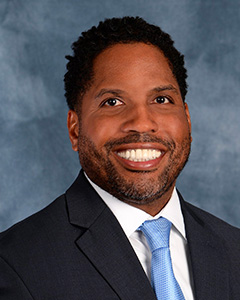Institutional Investor is proud to recognize leaders within the allocator community for their outstanding contributions to portfolio development at the second annual AlphaEdge Recognition Dinner. Prior to the event, we sat down with Waymond Harris, CFA, recognized in the category of Next Generation Recognitions.
Waymond has risen through the ranks at Blue Cross Blue Shield of Michigan since he first joined the $11 billion, Detroit-based insurance company in October 2012, starting as an investment analyst to his current role of the Senior Vice President and Treasurer. After he received a Bachelor of Science degree from the United States Military Academy, he served three years as a Lieutenant in the U.S. Army then spent a year as a Process Control Manager at General Motors.
He shifted his focus at the MIT Sloan School of Management, where he earned an MBA in Financial Engineering. Following graduation, he spent a decade on the GP side, including Merrill Lynch, Bear Stearns, and Semaphore Management.
The following has been edited for length and clarity.
What is the biggest challenge facing the industry today?
 I think the biggest challenge is the growth of the industry, asset allocation industry and investment community as a whole. As everyone chases alpha, it disappears over time, so it’s incumbent on us to have new and additional resources.
I think the biggest challenge is the growth of the industry, asset allocation industry and investment community as a whole. As everyone chases alpha, it disappears over time, so it’s incumbent on us to have new and additional resources.
The other challenge is the war for talent: 10 or more years ago, before I became an asset allocator, there was always the issue of pulling in people with compensation; now people look at it more as a career path, so there’s more people clamoring to be in the seats we’re in, but that makes the war for talent harder.
Do you think people are taking risks today that they’ve never taken before?
I wouldn’t say people are taking risks that they’ve never taken before, but as I mentioned earlier, people have to make investments with an ever-shrinking pool of alpha, and maybe now investors are making investments where they don’t fully understand all the risks associated with those investments.
You can look at the pension stress we saw in the UK – sometimes you don’t realize the risk until you see a cycle. At BCBSM, when we analyze new and innovative investment products, we make sure we have a firm understanding of all the risks associated with those investments. That said, we know there will be investors who are willing to take on risks and new investment ideas without as much information as we would like.
What are you most excited about?
We have an internal team that manages 80% of our portfolio, and because we have the most control over those investments, we’re able to come up with our investment thesis, understand the market and implement those investments quickly and succinctly.
We love allocating to outside investments, so it may be the control freak in me or that our team gelled so well, but I am excited about the opportunity we see in our liquid assets which we manage ourselves. Obviously, we can’t outperform all the time, but our track record shows that we’re able to provide alpha over the long-term.
Who are your mentors?
Life mentors, first and foremost: my mother and father. However, over my career at each of my organizations, a lot of my mentors have been peers.
I think mentoring is like any other relationship – you have to find someone you gel with – and in the finance industry, I’ve had peers in each job that have been able to help guide me along the way.
If you weren’t an allocator, what would you be doing today?
I’ll give you two answers: My answer has always been, “I would have wanted to be a WWE wrestler”; if you look at my resume, I was a Lieutenant in the Army, and my undergrad was industrial engineering, so it would probably have been in industrial engineering.
What is the one thing that needs to change?
I’ve seen our industry come a long way in diversity and inclusion, and we’re looking to include diverse and inclusive managers, but it’s also important to look at investment officers, and it really helps us to generate alpha. I think as an industry, that’s a thing we can continue to look at improving.
For more content of Investor Week, visit the group here.
To discuss the content of this article or gain access to like content, log in or request membership here.
